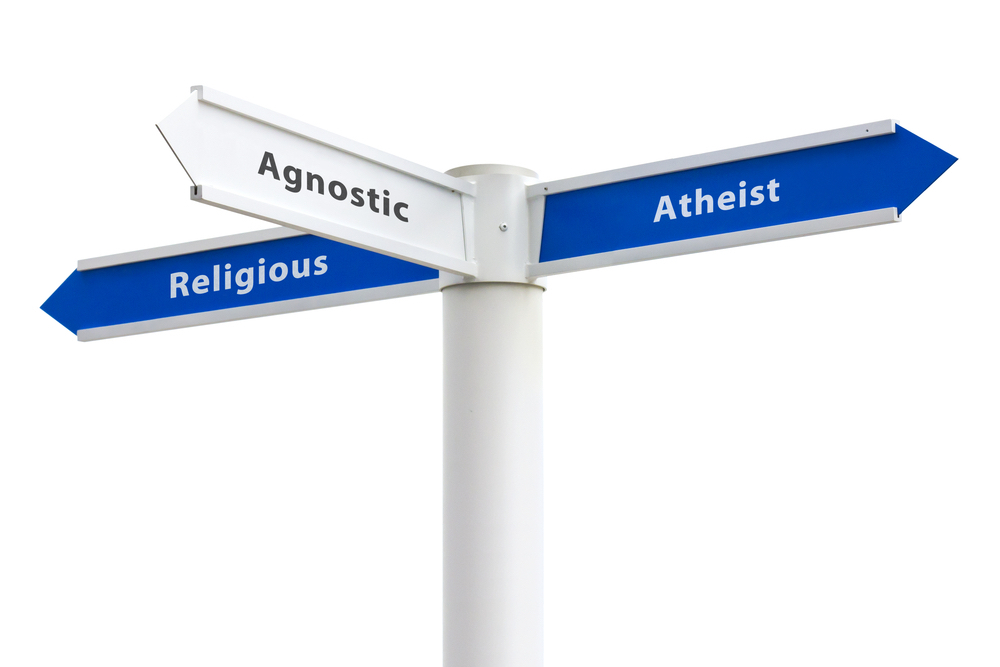
Nearly one-quarter of Americans claim to be non-religious with not religious affiliation. CNN reported in April 2019 that 23% of our population fell into the “No Religion” category in 2018’s General Social Survey. Their numbers have steadily grown since the 1990s, and they represent a diverse group of people: atheists, agnostics, those claiming to be spiritual but non-religious, and people who just don’t identify with any particular faith. While atheists and agnostics are commonly confused with each other, the truth is more complex. With this in mind, it’s worth taking a look at these fast-growing non-religious groups in American society.
A Quick Overview of Atheism
The term “atheist” seems straightforward at first glance. This individual does not express belief in any sort of deity, Abrahamic or otherwise. The advocacy group American Atheists explains that atheism “is not a disbelief in gods or a denial of gods; it is a lack of belief in gods.” It’s not a religion unto itself, but the organization points out that a “sincerely held (lack of) beliefs” is protected by the U.S. Constitution in the same way as religious faiths.
Yet American Atheists’ definition is just one of many. The Atheist Alliance echoes the idea that atheism starts with not possessing a belief in any gods. Some atheists don’t stridently argue against the existence of deities, while others strongly assert that there are none at all. The latter group is often referred to as hard or positive atheists, while those who don’t actively argue that gods do not exist are soft or negative atheists.
What Is Agnosticism?
Some individuals refer to themselves as agnostics instead of atheists. The Encyclopedia Britannica provides a strict definition as a doctrine that “humans cannot know of the existence of anything beyond the phenomena of their experience.” The term was coined in 1869 by British biologist T.H. Huxley, who initially used it as a broader term for ignorance of things beyond one’s experience and the limits of human knowledge.
As Huxley put it, his major qualm with some religious thinkers of his day was their position “that it is morally wrong not to believe certain propositions, whatever the results of strict scientific investigation of the evidence of these propositions.” It’s important to note that Huxley didn’t originate agnosticism, as religious skepticism has its place in even older Hindu philosophies.
Where the Two Can Overlap
When describing atheism, American Atheists declares: “Atheism is about what you believe. Agnosticism is about what you know.” This is a simplified version of both ideas, but it demonstrates room for the two to intersect. Some who embrace this overlap call themselves agnostic atheists: lacking belief in supreme beings yet also claiming that it’s currently impossible to know whether any exist. In contrast, agnostic theists may be willing to entertain a belief in deities but also insist that the ultimate truth on this matter is unknowable.
Humanist, Freethinker, and Other Key Terms
Some atheists and agnostics say that they subscribe to Humanism, Freethinking, Bright, or a similar term. These are all independent movements, but they share a common philosophical and ethical approach that doesn’t rely on religious beliefs. The American Humanist Association advocates human dignity, individual liberty, and the idea that people can live ethical and fulfilling lives without religion. The Freedom From Religion Foundation emphasizes critical thought when evaluating supernatural ideas, but adds that Freethinkers see morality as “simply what does not hurt others.” The Brights strive for ethics and actions that are free of supernatural and mystical elements, advocating for a “naturalistic worldview.”
As humans, we have a choice to follow the traditions we’re raised in or to choose other paths. With more people rejecting or becoming indifferent to religion, they’re finding ways to express their ideas. Atheism and agnosticism are just a couple of terms, but they encompass a wide range of non-religious unique worldviews.

